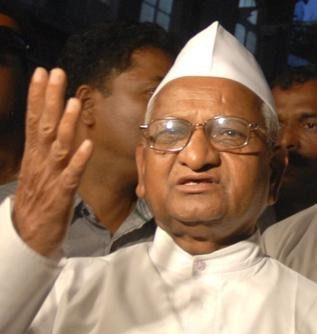Indian Activist Anna Hazare Agrees to Leave Jail, Start Fast

India's anti-corruption activist Anna Hazare agreed to leave prison Thursday after being allowed by the government to continue his widely anticipated hunger strike at a park in central Delhi for at least 15 days.
The 74-year-old activist had previously been arrested on Tuesday just hours ahead his planned fast to demand the government to come up with tougher laws against corruption.
His arrest created a wave of protests across India and tens of thousands of people took to the street to protest against the government's move. Within 24 hours, more than 120,000 Indians signed an online petition demanding his release, at a rate of almost 70 people a second.
Under increasing pressure and criticisms from the people and opposition leaders, the government agreed to free Hazare on Wednesday, but the Gandhian activist refused to leave prison until he was assured he could continue his hunger strike on the outside.
His followers, who had gathered outside of outside Delhi's high-security Tihar Jail, welcomed the news of the new deal with cheers and chants, but warned that they will not give up their struggle against corruption.
Moments after his arrest, Hazare and his supporters released a pre-recorded video calling for a "second freedom struggle" against corruption and it seems they are determined their fight is far from over.
Hazare is now expected to leave the jail later Thursday or on Friday, once police have cleaned and prepared the Ramila grounds for the protest, and he urged supporters to join in the protest.
Hazare's supporters have clashed with the government over the scope of its bill to create an anti-corruption watchdog.
After nine meetings with the government, Hazare and his supporters came up with their own version of the Lokpal (Citizen's Ombudsman) bill, which they say should be made into law.
But the government is insisting on its own anti-corruption bill, which it says contains 34 of the 40 principles of Hazare's bill; it is now being studied by a parliamentary committee.
The decision did not satisfy Hazare and his supporters, who said the law should be tougher and not exempt top officials like the prime minister.
Hazare said the legislation is a "cruel joke" and describes his struggle as the "second war of independence."
While Hazare's campaign against corruption is very popular in India, with even more people joining the movement since the arrest, critics have raised concerns both with his tactics and warned against a polarisation of the anti-corruption debate between the authorities and Hazare's that risks trivialising the real issues.
On Wednesday Prime Minister Manmohan Singh accused Hazare of wanting legislation on his terms only.
"The path he has chosen to impose his draft of a bill upon Parliament is totally misconceived and fraught with grave consequences for our parliamentary democracy," Singh said. "Those who believe that their voice and their voice alone represents the will of 1.2 billion people should reflect deeply on that position."
Hazare's supporters accused the government of stifling Hazare's right to protest and insist Parliament was elected to serve the people and should not prevent them from fighting against corruption.
Supporters also were angered that Hazare was sent to the same high-security jail that houses a former government minister and other senior officials implicated in two corruption scandals that surfaced last year.
While many first said Hazare's supporters were mainly from the middle class, recent days have shown that many factions and classes from Indian society joined in his movement.
© Copyright IBTimes 2025. All rights reserved.





















